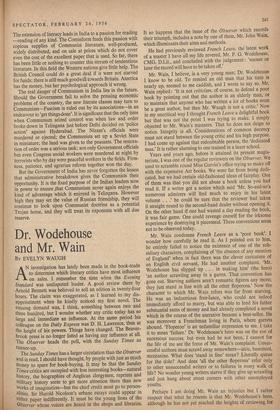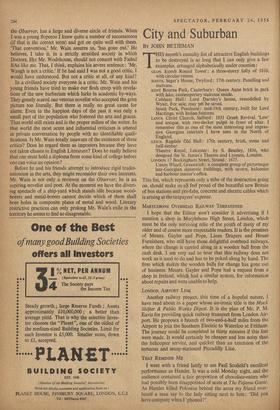Dr. Wodehouse and Mr. Wain
By EVELYN WAUGH N investigation has lately been made in the book-trade A to determine which literary critics have most influence on sales. I remember the time when the Evening Standard was undisputed leader. A good review there by Arnold Bennett was believed to sell an edition in twenty-four hours. The claim was exaggerated, as I learned to my dis- appointment when he kindly noticed my first novel. The ensuing demand was, I think, something between two and three hundred, but I wonder whether any critic today has so large and immediate an influence. At the same period his colleague on the Daily Express was D. H. Lawrence, then at the height of his powers. Things have changed. The Beaver- brook press is no longer listed as having any influence at all. The Observer heads the poll, with the Sunday Times as runner-up.
The Sunday Times has a larger circulation than the Observer and is read. I should have thought, by people with just as much money to spare for book-buying. It may be that the Sunday Times critics are occupied with less interesting books—natural history, the biographies of Anglican clergymen, reprints and military history seem to get more attention there than new works of imagination—but the chief credit must go to person- alities. Sir Harold Nicolson's urbane essays could appear in either paper indifferently. It must be the young lions of the Observer whose voices are heard in the shops and libraries. It so happens that the issue of the Observer which records their triumph, includes a note by one of them, Mr. John Wain, which illuminates their aims and methods.
He had previously reviewed French Leave, the- latest work of a master I have all my life revered, Mr. P. G. Wodehouse, CMG, D.Lit., and concluded with the judgement : 'sooner or later the record will have to be taken off.'
Mr. Wain, I believe, is a very young man; Dr. Wodehouse I know to be old. To remind an old man that his time is nearly up, seemed to me caddish, and I wrote to say so. Mr. Wain replied : 'It is not criticism, of course, to defend a poor book by pointing out that the author is an elderly man, or to maintain that anyone who has written a lot of books must be a great author, but then Mr. Waugh is not a critic.' Now in my uncritical way I thought French Leave a delightful book but that was not the point I was trying to make. I simply objected to Mr. Wain's manners. That he does not deign to notice. Integrity is all. Considerations of common decency must not stand between the young critic and his high purpose. I had come up against that redoubtable person, the 'dedicated man.' It is rather alarming to one trained in a laxer school.
Years and years ago, before it attained its present magis- terium, I was one of the regular reviewers on the Observer. We used to scramble round Miss Garvin's office trying to make off with the expensive Art books. We were far from being dedi- cated, but we had certain old-fashioned ideas of fairplay. One of them was that you did not abuse a book unless you had read it. If a writer got a notice which said 'Mr. So-and-so's numerous admirers will find much to enjoy in his latest volume . . .' he could be sure that the reviewer had taken it straight round to the second-hand dealer without opening it. On the other hand if one had wasted a day reading the book, it was fair game. One could revenge oneself for the irksome experience by destroying it piecemeal. These conventions seem not to be observed today.
Mr. Wain condemns French Leave as a 'poor book'. I wonder how carefully he read it. As I pointed out to him, he entirely failed to notice the existence of one of the sub- sidiary characters, complaining of 'the absence of any mention of England' when in fact there was the clever caricature of an English civil servant. He had another complaint. 'Mr. Wodehouse has slipped up . . . in making him' (the hero) 'an author scrawling away in a garret. That convention has gone out. Starving authors aren't romantic figures any more; they just stand in line with all the other floperoos.' Now the character to which Mr. Wain refers was far from starving. He was an industrious free-lance, who could not indeed immediately afford to marry, but was able to lend his father substantial sums of money and had already completed a novel which in the course of the narrative became a best-seller. He was moreover a Frenchman living in Paris, where garrets abound. Ploperoo' is an unfamiliar expression to me. I take it to mean 'failure.' Dr. Wodehouse's hero was on the eve of enormous success, but even had he not been, I cannot for the life of me see the force of Mr. Wain's complaint. Unsuc- cessful authors must scrawl away somewhere—attic, basement. mezzanine. What does 'stand in line' mean? Literally queue for the dole? And does 'all the other floperoos' refer only to other unsuccessful writers or to failures in every walk of life? No wonder young writers starve if they give up scrawling and just hang about street corners with other unemployed youths.
Perhaps I am doing Mr. Wain an injustice but I rather suspect that what he resents is that Mr. Wodehouse's hero. although he has not yet reached the heights of reviewing for the Observer, has a large and diverse circle of friends. When I was a young floperoo I knew quite a number of successeroos (if that is the correct term) and got on quite well with them. `That convention,' Mr. Wain assures us, `has gone out.' He believes, I take it, in a strictly stratified society in which Doctors, like Mr. Wodehouse, should not consort with Failed I3As like me. That, I think, explains his severe sentence : 'Mr. Waugh is not a critic.' If he had said 1 was not a good critic, I would have understood. But not a critic at all. of any kind?
In a civilised society everyone is a critic. Mr. Wain and his young friends have tried to make our flesh creep with revela- tions of the new. barbarism which lurks in academic by-ways. They greatly scared one veteran novelist who accepted the grim picture too literally. But there is really no great cause for alarm. Even in the happiest days of the past it was only a small part of the population who fostered the arts and graces. That world still exists and is the proper milieu of the writer. In that world the most acute and influential criticism is uttered in private conversation by people with no identifiable quali- fications. Is Mr. Wain totally unaware of the existence of these critics? Does he regard them as imposters because they have not taken classes in English Literature? Does he really believe that one must hold a diploma from some kind of college before one can voice an opinion?
Before he and his friends attempt to introduce rigid trades- unionism in the arts, they might reconsider their own interests. Mr. Wain is not only a reviewer on the Observer; he is an aspiring novelist and poet. At the moment we have the divert- ing spectacle of a ship-yard, which stands idle because wood- borers and metal-borers cannot decide which of them shall bore holes in composite plates of metal and wood. Literary restrictive practices can only prolong Mr. Wain's exile in the territory he seems to find so disagreeable.



































 Previous page
Previous page